Complexities Of Nuclear Energy Generation
Nuclear Energy
Conversation With Chat GPT4 27 March 2024
Articles Series: Energy
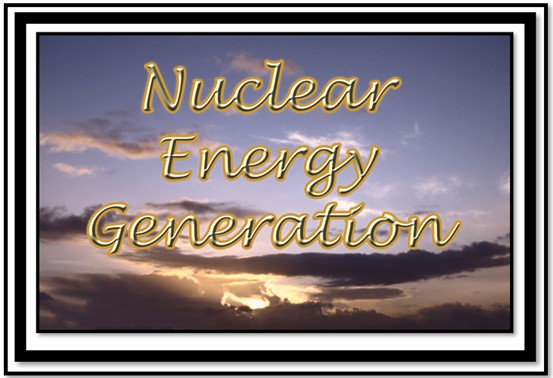
Nuclear Energy Generation Artwork
F McCullough Copyright 2024 ©
The Complexities Of Nuclear Energy Generation
Nuclear energy, a potent source of electricity that has been used for decades, stands at the crossroads of intense debate due to its unique blend of benefits and challenges. While it offers a high-energy output with relatively low greenhouse gas emissions, the issues surrounding nuclear generation are complex, involving environmental, safety, and economic concerns.
Nuclear Energy: An Overview
Nuclear energy is generated through the process of nuclear fission, where the nucleus of an atom is split into smaller parts, releasing a significant amount of energy. This process takes place in a nuclear reactor, where the energy released is used to heat water, producing steam that drives turbines to generate electricity.
Environmental Impacts
One of the primary advantages of nuclear energy is its low greenhouse gas emissions compared to fossil fuels. However, it is not without its environmental concerns.
Radioactive Waste
Long-term Storage: The radioactive waste produced by nuclear reactors remains hazardous for thousands of years, necessitating secure, long-term storage solutions.
Disposal Challenges: Finding suitable locations for waste disposal sites is politically and socially challenging, with potential risks to communities and ecosystems.
Nuclear Accidents
Historical Precedents: Incidents like Chernobyl and Fukushima have raised significant concerns about the environmental impacts of nuclear accidents, including long-term radiation exposure and ecosystem damage.
Safety Measures: Although modern nuclear plants are designed with advanced safety features, the potential for catastrophic failure, however unlikely, cannot be entirely eliminated.
Economic Considerations
The economics of nuclear energy generation are complex, influenced by high initial costs, long construction periods, and the financial risks associated with decommissioning and waste management.
High Capital And Operating Costs
Initial Investment: Nuclear power plants require significant upfront investment, often more expensive than renewable energy sources or natural gas plants.
Decommissioning Costs: The process of decommissioning a nuclear plant after its operational life is costly and time-consuming.
Market Competitiveness
Renewable Energy: The falling costs of renewable energy technologies like solar and wind pose competitive challenges to nuclear energy, especially when considering subsidies and support for renewables.
Safety And Security
Safety and security are paramount in the operation of nuclear power plants, given the potential consequences of accidents or malicious attacks.
Reactor Safety
Design and Operation: Modern reactor designs incorporate passive safety systems and redundancies to prevent accidents. However, the inherent complexity and potential for human error remains a concern.
Ageing Infrastructure: Many existing nuclear reactors are approaching, or have exceeded their initial design lifespans, raising questions about their continued long-term safety and efficiency.
Nuclear Proliferation
Dual-Use Technology: The technology used in nuclear energy can also be used for nuclear weapons development, raising concerns about war-like proliferation and the need for stringent international oversight.
Public Perception And Political Challenges
Public opinion and political will are critical factors in the development and expansion of nuclear energy.
Societal Acceptance
Nuclear Stigma: Historical accidents and the association with nuclear weapons have contributed to public apprehension about nuclear power.
Community Opposition: Proposed nuclear projects often face strong opposition from local communities concerned about safety and environmental risks.
Policy And Regulatory Environment
Government Support: The future of nuclear energy heavily depends on governmental policies, including investment in research, regulatory frameworks, and support for new projects.
International Cooperation: Global treaties and agreements play a crucial role in setting safety standards, facilitating technological exchange, and ensuring non-proliferation.
Summary
Nuclear energy generation is a complex conundrum, balancing the risks of high-energy output and low carbon emissions, against the backdrop of significant environmental, safety, and economic challenges and concerns. Addressing these issues requires a sensible approach, incorporating technological innovations, stringent safety protocols, and transparent public engagement. As the world continues to seek sustainable and reliable energy sources, the role of nuclear power remains a subject of rigorous scrutiny and debate.
Key Takeaways
The discourse on nuclear energy generation unveils a spectrum of environmental, safety, and economic issues, necessitating a holistic approach to harness its potential, whilst mitigating associated risks and fostering and engendering public trust.
Conversation with Open AIís ChatGPT4 Reviewed, Revised and Edited by F McCullough, Copyright 2024 ©
Thought Of The Day
The energy sector's greatest
resource is the power it harnesses, together with the minds that strive to make
it sustainable and equitable
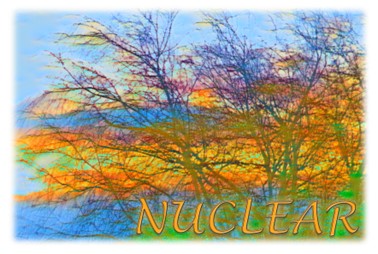
Nuclear Artwork
F McCullough
Copyright 2024 ©
Artwork
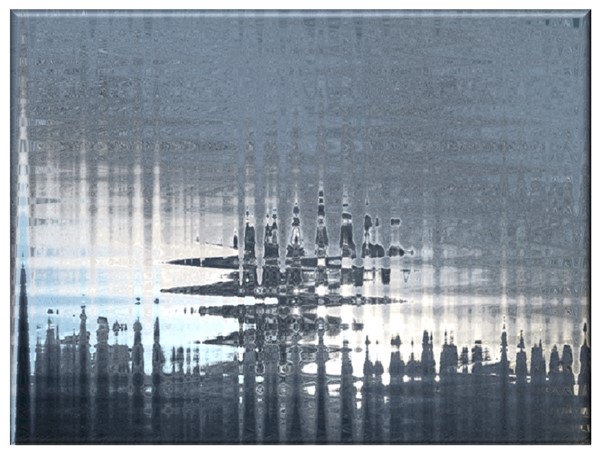
Nuclear Impact Artwork
F McCullough Copyright 2024 ©
Theme Art
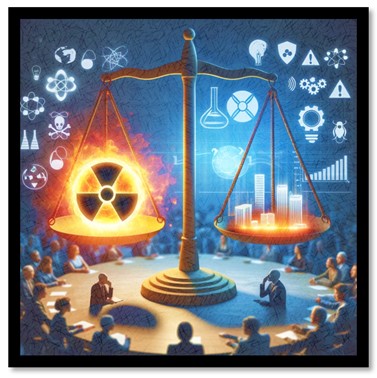
Weighing The Risks Artwork
AI Generated Image From Dall-E 2024 Theme Art, Edited And Adapted by F McCullough
The illustrated image captures the paradox of nuclear energy generation, portraying a balance scale where high-energy output and low carbon emissions are weighed against significant environmental, safety, and economic challenges. The scene is enriched by the backdrop of public engagement, symbolising the ongoing debate and scrutiny nuclear power undergoes in societal discourse.
Open AIís ChatGPT4 Reviewed, Revised and Edited by F McCullough 2024.
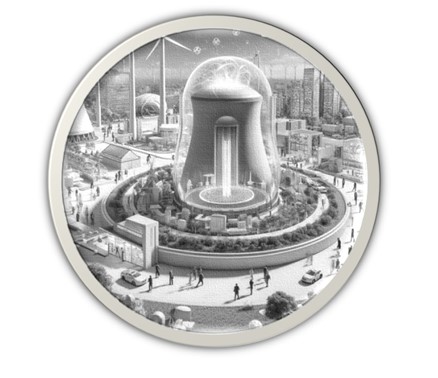
Fusion Reactor Artwork
AI Generated Image From Dall-E 2024 Theme Art, Edited And Adapted by F McCullough
The illustration envisions a future where nuclear energy, embodied by a fusion reactor, coexists with renewable sources within a vibrant city. This futuristic scene underscores the integration of technological innovations for safety, public engagement through educational initiatives, and a harmonious blend of energy sources, highlighting a sustainable approach to nuclear power alongside renewables. It is in black and white, representing that it may be a bright future, or a potential risky future.
Open AIís ChatGPT4 Reviewed, Revised and Edited by F McCullough 2024.
Links
Agriculture
Articles
Artificial Intelligence
Business
Ecology
Education
Energy
Finance
Genomics
Goats
Health
History
Leadership
Marketing
Medicine
Museums
Photographs & Art Works
Artworks, Design & Photographs Index
Other Photographs & Art Works By F McCullough
Places To Visit
Other Museums And Places To Visit
Plants
Poetry
Research
Science & Space
Science & Space Articles & Conversations
Short Stories
Songs
Technology
Information
Image Citations
- Nuclear Energy Generation Artwork F McCullough Copyright 2024 ©
- Nuclear Artwork F McCullough Copyright 2024 ©
- Nuclear Impact Artwork F McCullough Copyright 2024 ©
- Weighing The Risks Artwork Adapted And Edited From An AI Generated Image by F McCullough 2024
- Fusion Reactor Adapted And Edited From An AI Generated Image by F McCullough 2024
Table Of Contents
The
Complexities Of Nuclear Energy Generation
High Capital
And Operating Costs
Public
Perception And Political Challenges
Policy And
Regulatory Environment
Copyright
Keywords: adaptive leadership,
artificial intelligence, bioenergy, carbon capture and storage, circular
economy, clean energy transition, climate change, data analytics, digital
transformation, energy efficiency, energy storage, environmental stewardship,
ethical leadership, global energy markets, innovation, leadership skills,
renewable energy, smart technologies, stakeholder engagement, sustainability,
technological disruption, waste-to-energy, wind and solar power,
Hashtags: #adaptiveleadership,
#artificialintelligence, #bioenergy, #carboncaptureandstorage,
#circulareconomy, #cleanenergytransition, #climatechange, #dataanalytics,
#digitaltransformation, #energyefficiency, #energystorage,
#environmentalstewardship, #ethicalleadership, #globalenergymarkets,
#innovation, #leadershipskills, #renewableenergy, #smarttechnologies,
#stakeholderengagement, #sustainability, #technologicaldisruption,
#wastetoenergy, #windandsolarpower
Created: 27 March 2024
Published: 27 March 2024
Page URL: https://www.mylapshop.com/nuclearenergygeneration.htm
